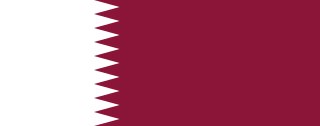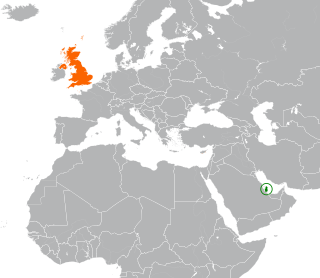Related Research Articles

Natives of the Arabian Peninsula, many Qataris are descended from a number of migratory Arab tribes that came to Qatar in the 18th century from mainly the neighboring areas of Nejd and Al-Hasa. Some are descended from Omani tribes. Qatar has about 2.6 million inhabitants as of early 2017, the vast majority of whom live in Doha, the capital. Foreign workers amount to around 88% of the population, the largest of which comprise South Asians, with those from India alone estimated to be around 700,000. Egyptians and Filipinos are the largest non-South Asian migrant group in Qatar. The treatment of these foreign workers has been heavily criticized with conditions suggested to be modern slavery. However the International Labour Organization published report in November 2022 that contained multiple reforms by Qatar for its migrant workers. The reforms included the establishment of the minimum wage, wage protection regulations, improved access for workers to justice, etc. It included data from last 4 years of progress in workers conditions of Qatar. The report also revealed that the freedom to change jobs was initiated, implementation of Occupational safety and health & labor inspection, and also the required effort from the nation's side.
Foreign relations of Qatar is conducted through its Ministry of Foreign Affairs. Arab states were among the first to recognize Qatar, and the country gained admittance to the United Nations and the Arab League after achieving independence in 1971. The country was an early member of OPEC and a founding member of the Gulf Cooperation Council (GCC). Diplomatic missions to Qatar are based in its capital, Doha.

Sheikha Moza bint Nasser Al-Missned is one of the three consorts of Sheikh Hamad bin Khalifa Al Thani, the former Emir of the State of Qatar and mother of the current Emir Tamim bin Hamad Al Thani. She is the co-founder and chair of the Qatar Foundation, the largest state-owned NPO in the country.

Sheikh Tamim bin Hamad bin Khalifa Al Thani is Emir of Qatar, reigning since 2013.

Qatar, officially the State of Qatar, is a country in West Asia. It occupies the Qatar Peninsula on the northeastern coast of the Arabian Peninsula in the Middle East; it shares its sole land border with Saudi Arabia to the south, with the rest of its territory surrounded by the Persian Gulf. The Gulf of Bahrain, an inlet of the Persian Gulf, separates Qatar from nearby Bahrain. The capital is Doha, home to over 80% of the country's inhabitants, and the land area is mostly made up of flat, low-lying desert.

The Qatar Red Crescent Society, the Qatari branch of the Red Crescent Society, was established in 1978. In 1981, it gained international recognition from the International Committee of the Red Cross in Geneva and joined the International Federation of Red Cross and Red Crescent Societies (IFRC). It is also a member of the Secretariat of Arab Red Crescent Societies in Jeddah. It became the first philanthropic organization in Qatar to establish a women's branch in 1982.
Bader Al Dafa is a Qatari diplomat who has been the Executive Director of the Global Dryland Alliance since 2012. He served from 2007 to 2010 as the United Nations Executive Secretary of the Economic and Social Commission for Western Asia (ESCWA). He was appointed to the position by United Nations Secretary-General Ban Ki-moon in July 2007.

Qatar established unofficial trade relations with the State of Israel in 1996, the first amongst all nations of the Arabian Peninsula after Oman reportedly did, concurrently with Israel–Jordan peace treaty. Until 2009, Qatar and Israel maintained trade relations, but due to Operation Cast Lead, Qatar broke the trade with Israel.
Qatar News Agency is a state-run Qatari news agency.

The State of Qatar and the Republic of Turkey established bilateral relations in 1972. There has been ongoing cooperation and dialogue in regional and international issues since the 2010s, particularly in the Syrian Civil War and the Egyptian Crisis. Both countries also support the same groups in post-Gaddafi Libya. Most recently, Turkey provided diplomatic and food support to Qatar during the 2017 Qatar diplomatic crisis. Some political analysts claim that bilateral relations are mostly limited to political and military affinity, referring to the low trade volume, lack of trade agreements and absence of Turkish think tanks in Qatar.

Qatar Museums is a Qatari government entity that oversees the Museum of Islamic Art (MIA), Mathaf: Arab Museum of Modern Art, MIA Park, QM Gallery at the Katara Cultural Village, ALRIWAQ DOHA Exhibition Space, the Al Zubarah World Heritage Site Visitor Centre, and archaeological projects throughout Qatar, as well as the development of future projects and museums that will highlight its collections across multiple areas of activity including Orientalist art, photography, sports, children's education, and wildlife conservation.
The Ministry of Foreign Affairs is the ministry responsible for handling Qatar's external relations as well as its diplomatic efforts, including the maintenance of its diplomatic missions across the globe. The current minister is Mohammed bin Abdulrahman Al Thani.
Qatar Charity is a humanitarian and development non-governmental organization in the Middle East. It was founded in 1992 in response to the thousands of children who were made orphans by the Afghanistan war and while orphans still remain a priority cause in the organization's work with more than 150,000 sponsored orphans, it has now expanded its fields of action to include six humanitarian fields and seven development fields.
Qatar has been accused of allowing terror financiers to operate within its borders, which has been one of the justifications for the Qatar diplomatic crisis that started in 2017 and ended in 2021. In 2014, David S. Cohen, then United States Under Secretary of the Treasury for Terrorism and Financial Intelligence, accused Qatari authorities of allowing financiers who were on international blacklists to live freely in the country: "There are U.S.- and UN-designated terrorist financiers in Qatar that have not been acted against under Qatari law." Accusations come from a wide variety of sources including intelligence reports, government officials, and journalists.

Qatar – United Kingdom relations are the bilateral relations between the State of Qatar and the United Kingdom of Great Britain and Northern Ireland, covering a wide range of issues and activities of mutual interest.

France–Qatar relations are the bilateral relations between France and the Qatar. The first embassy to be established was the Qatari embassy in France in 1972, and the first bilateral agreement was signed in 1974. Qatar has marked various concurrences with France, covering all areas such as cultural, political, economical, academic, scientific and military agreements. The nations are tied in a key discourse protocol, where conversation over various issues of significance to the two capitals are occurring consistently.

The International Solar Alliance (ISA) is an alliance of more than 120 signatory countries, most being sunshine countries, which lie either completely or partly between the Tropic of Cancer and the Tropic of Capricorn. The primary objective of the alliance is to work for the efficient consumption of solar energy to reduce dependence on fossil fuels. This initiative was first proposed by Indian Prime Minister Narendra Modi in a speech in November 2015 at Wembley Stadium, in which he referred to sunshine countries as Suryaputra. The alliance is a treaty-based inter-governmental organization. Countries that do not fall within the Tropics can join the alliance and enjoy all benefits as other members, with the exception of voting rights.
The Qatar diplomatic crisis was a high-profile incident involving the deterioration of ties between Qatar and the Arab League between 2017 and 2021. It began when Saudi Arabia, the United Arab Emirates, Bahrain, and Egypt simultaneously severed their bilateral relations with Qatar and subsequently banned Qatar-registered aircraft and Qatari ships from utilizing their sovereign territory by air, land, and sea; this involved the Saudis' closure of Qatar's only land crossing, initiating a de facto blockade of the country. Tensions between the two sides came to a close in January 2021, following a resolution between the Saudis and the Qataris.

The Kingdom of Morocco and the State of Qatar formed diplomatic relations in 1972. There is substantial economic cooperation between the two countries, with Qatar being one of the largest foreign investors in Morocco. A $2 billion joint venture between Qatar's sovereign wealth fund and Morocco was established in 2011.

China – Qatar relations are the bilateral relations between the People's Republic of China and the State of Qatar. China has an embassy in Doha, while Qatar has an embassy in Beijing. With diplomatic relations first formed in 1988, Qatar is a strategic ally of China, and the two countries maintain a strong relationship.
References
- 1 2 "Year Book Profile: Global Dryland Alliance (GDA)". Union of International Associations. Archived from the original on 26 July 2018. Retrieved 26 July 2018.
- 1 2 "Morocco Signs Global Dryland Alliance Foundation Treaty". Agence Marocaine de Presse. 16 October 2017. Retrieved 26 July 2018.[ permanent dead link ]
- ↑ "Dryland Management Must Be Placed Higher on International Agenda, Stresses Secretary-General at High-level General Assembly Event on Desertification". United Nations. 20 September 2011. Retrieved 26 July 2018.
- 1 2 3 "About us". Global Dryland Alliance. Archived from the original on 26 July 2018. Retrieved 26 July 2018.
- ↑ "Doha chosen as Global Dryland Alliance headquarters". thepeninsulaqatar.com. Qatar News Agency. 19 April 2018. Archived from the original on 19 April 2018. Retrieved 26 July 2018.
- ↑ "Foundation treaty to be signed at Global Dryland Alliance meet". The Peninsula. 15 October 2017. Retrieved 26 July 2018.